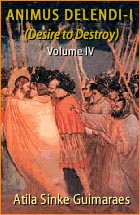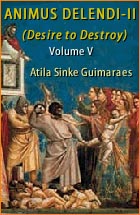Catholic Virtues
 |
 |
 |
 |
 |
 |
 |
Trio of Counter-Revolutionary Virtues - I
Spain’s Fervor in the Civil War & Its Decadence
I have before me an excerpt from the book by the Jesuit Frederico Duckerman titled Listening to the Soul of Spain (Ouvindo a Alma de Espanha), which records letters written between 1936 and 1937. He says the following:
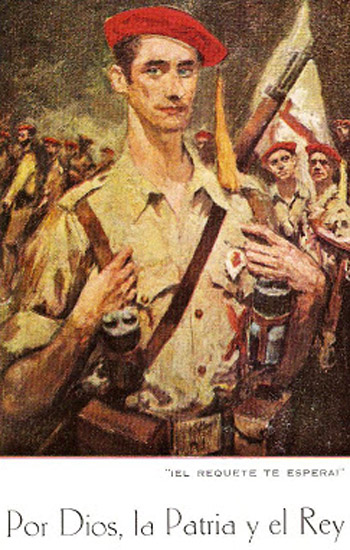 "The soldiers and the Falangists of Salamanca place an image of the Heart of Jesus on their banners. The Falangists of Seville started by placing a small image of the Heart of Jesus on their uniform. Now, every officer and soldier of the army wears the shield of the Sacred Heart, including General Queipo de Llano. The armored truck of our unit bears a large effigy of the Sacred Heart, and people call us 'the troops of the Sacred Heart.'
"The soldiers and the Falangists of Salamanca place an image of the Heart of Jesus on their banners. The Falangists of Seville started by placing a small image of the Heart of Jesus on their uniform. Now, every officer and soldier of the army wears the shield of the Sacred Heart, including General Queipo de Llano. The armored truck of our unit bears a large effigy of the Sacred Heart, and people call us 'the troops of the Sacred Heart.'
"All of society is being purified, refined and elevated. Scenes like these are happening everywhere: In Valladolid the stands with pornographic literature have been reduced to ashes. Youth associations send their members to bookstores to remove the books that are immoral or hostile to Religion. This youth will completely reform university life.
"On board the ship 'Canarias': At night there was singing; the commander reintroduced this old custom of the Spaniards who sang the song you know: 'Thou Who commands the winds and the sea, Who stops the winds and silences the storms have mercy of us O Lord, mercy O Lord, mercy.'
"The Count composed a Book of Prayers for the Requeté (Carlist militia man). In the fighting in Navarre six young volunteers were in a patrol service. They confessed, departed and did not return. A few days later, when our troops overtook that enemy position, they found the bodies of the six all dead.
"One of those brave young men had not died immediately, for his body lay sideways, his head resting on his right hand. His left hand held the Prayer Book of the Requeté, open before those eyes that no longer saw. On the open page was the Prayer for the Dying."
The typical holocaust of Spanish heroism
These facts are very beautiful. One of the most impressive for me was the story of the Carlist youth, the requeté of Navarre, who died while praying the Prayer of the Dying.
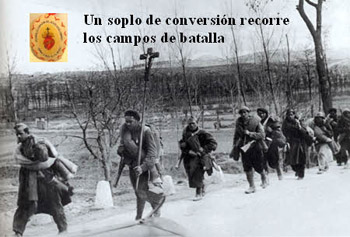 He was one of an investigative patrol who all died on a mission. The youth was shot, fell and realized that he was badly wounded and in his last agony. He leaned his head on one of his hands and began to read the Prayer of the Dying. There Our Lord reaped his soul and, probably, took it to Heaven.
He was one of an investigative patrol who all died on a mission. The youth was shot, fell and realized that he was badly wounded and in his last agony. He leaned his head on one of his hands and began to read the Prayer of the Dying. There Our Lord reaped his soul and, probably, took it to Heaven.
This picture of the combatant found dead, having before his eyes, which no longer see, the prayer book open to the page of the Prayer of the Dying, makes us feel, on the one hand, the last breaths of life and, on the other, the first cold breeze of death; it is truly impressive. It makes us feel very strongly the transit from life to death, and the soul that goes to Heaven. It makes us realize quite keenly the holocaust of the souls who immolate themselves and who, doing so, conquer Heaven, which is also very impressive.
This scene would merit a great poet, painter or sculptor to represent it adequately. The history of Spain is so filled with such scenes that it is almost impossible to select one. It would be necessary to draw one from a hat, since Spain is a country where heroism is habitually present in a boiling state.
The renewal of religious fervor in the Civil War
You also find in these facts from the Spanish Civil War of 1936 other manifestations of piety of the troops combating Communism. The writer speaks of a new fervor that ran through all of Spain, and provides some evidence that is very encouraging.
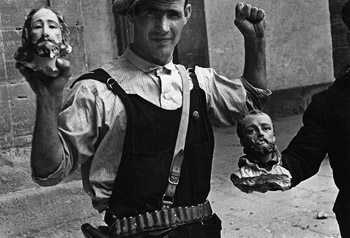
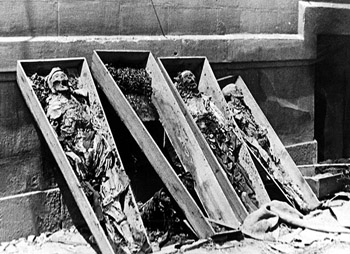 At that time Spain was a somewhat laicized country; the Revolution had entered; the Republic had been proclaimed and soon had taken on socialist tones; the signs of modern paganism had become sharply accentuated in various aspects of Spanish life. But, with the religious persecution, a general crystallization of Catholics took place.
At that time Spain was a somewhat laicized country; the Revolution had entered; the Republic had been proclaimed and soon had taken on socialist tones; the signs of modern paganism had become sharply accentuated in various aspects of Spanish life. But, with the religious persecution, a general crystallization of Catholics took place.
Some aspects draw our attention for a closer analysis. The first is how the opposition between Catholicism and Communism was clear at that time. The anti-communist troops marched into combat with the Sacred Heart of Jesus painted even on their tanks, and everyone thought it normal.
Since Communism is the cause of the Devil, the cause of Anti-Communism necessarily had to be that of God. And everyone judged the Sacred Heart to be the proper symbol of Anti-Communism, that this was the proper banner for it, that its very raison d'être was the defense of the rights of the Catholic Church, the rights of Religion.
The loss of religious fervor & pugnacity
It is astonishing and painful to note the change of spirit that has taken place since these heroic episodes. Today Spain seems, like all of Europe, to have lost its fiber and its anti-communist fervor. At the same time, it has even gone so far as to involve itself in Russian diplomacy, something that at one time Spain would have refused to do, even to the point of taking up arms.
The Civil War was in 1936. From then until today, what a turn-around! The anti-communists, who risked their lives in the religious fight, who did not hesitate to give their blood for Catholic Spain, were little by little set aside, scorned and boycotted while others, with an opposite mentality, came to occupy the leadership roles of the nation. How did this change take place?
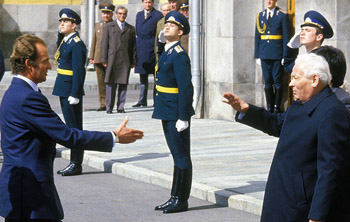 It crept in as a result of an attitude that entered, which we have often pointed out as dangerous: a spirit of rest and relaxation after victory, an apathy in the face of danger. Spain was infiltrated by an ambience of well-being, neutralism, ideological indifference with each individual turned toward enjoying his own mediocre private life. In this ambience many of the best Spaniards drifted to sleep.
It crept in as a result of an attitude that entered, which we have often pointed out as dangerous: a spirit of rest and relaxation after victory, an apathy in the face of danger. Spain was infiltrated by an ambience of well-being, neutralism, ideological indifference with each individual turned toward enjoying his own mediocre private life. In this ambience many of the best Spaniards drifted to sleep.
In the ideological terrain, sleep is the image of death, and after death starts putrefaction. It was this putrefaction that generated a softness, a connivance and complicity with the advance of the Revolution on Spanish soil, of which the universal current of Progressivism was one of the worst offenders.
Today anti-communists are frowned upon in almost every Catholic setting, and the pro-communists are well-regarded. Each of us, with those first combatants, can almost say: "Extraneus factus sum fratribus meis, et peregrinus filiis matris meae - I have become a stranger to my brothers, and a foreigner to my mother's children" (Ps 68:9). It is the moan of fidelity.
Continued


Youth moved by fervor fight Communism under the symbol of the Sacred Heart
"All of society is being purified, refined and elevated. Scenes like these are happening everywhere: In Valladolid the stands with pornographic literature have been reduced to ashes. Youth associations send their members to bookstores to remove the books that are immoral or hostile to Religion. This youth will completely reform university life.
"On board the ship 'Canarias': At night there was singing; the commander reintroduced this old custom of the Spaniards who sang the song you know: 'Thou Who commands the winds and the sea, Who stops the winds and silences the storms have mercy of us O Lord, mercy O Lord, mercy.'
"The Count composed a Book of Prayers for the Requeté (Carlist militia man). In the fighting in Navarre six young volunteers were in a patrol service. They confessed, departed and did not return. A few days later, when our troops overtook that enemy position, they found the bodies of the six all dead.
"One of those brave young men had not died immediately, for his body lay sideways, his head resting on his right hand. His left hand held the Prayer Book of the Requeté, open before those eyes that no longer saw. On the open page was the Prayer for the Dying."
The typical holocaust of Spanish heroism
These facts are very beautiful. One of the most impressive for me was the story of the Carlist youth, the requeté of Navarre, who died while praying the Prayer of the Dying.

Requetés carrying rifles and wearing Sacred Heart badges on a mission
This picture of the combatant found dead, having before his eyes, which no longer see, the prayer book open to the page of the Prayer of the Dying, makes us feel, on the one hand, the last breaths of life and, on the other, the first cold breeze of death; it is truly impressive. It makes us feel very strongly the transit from life to death, and the soul that goes to Heaven. It makes us realize quite keenly the holocaust of the souls who immolate themselves and who, doing so, conquer Heaven, which is also very impressive.
This scene would merit a great poet, painter or sculptor to represent it adequately. The history of Spain is so filled with such scenes that it is almost impossible to select one. It would be necessary to draw one from a hat, since Spain is a country where heroism is habitually present in a boiling state.
The renewal of religious fervor in the Civil War
You also find in these facts from the Spanish Civil War of 1936 other manifestations of piety of the troops combating Communism. The writer speaks of a new fervor that ran through all of Spain, and provides some evidence that is very encouraging.

Communists ravaged churches destroying statues and put the corpses of religious on display in a Barcelona street

Some aspects draw our attention for a closer analysis. The first is how the opposition between Catholicism and Communism was clear at that time. The anti-communist troops marched into combat with the Sacred Heart of Jesus painted even on their tanks, and everyone thought it normal.
Since Communism is the cause of the Devil, the cause of Anti-Communism necessarily had to be that of God. And everyone judged the Sacred Heart to be the proper symbol of Anti-Communism, that this was the proper banner for it, that its very raison d'être was the defense of the rights of the Catholic Church, the rights of Religion.
The loss of religious fervor & pugnacity
It is astonishing and painful to note the change of spirit that has taken place since these heroic episodes. Today Spain seems, like all of Europe, to have lost its fiber and its anti-communist fervor. At the same time, it has even gone so far as to involve itself in Russian diplomacy, something that at one time Spain would have refused to do, even to the point of taking up arms.
The Civil War was in 1936. From then until today, what a turn-around! The anti-communists, who risked their lives in the religious fight, who did not hesitate to give their blood for Catholic Spain, were little by little set aside, scorned and boycotted while others, with an opposite mentality, came to occupy the leadership roles of the nation. How did this change take place?

Spain's King Juan Carlos visited the Soviet Union in 1984 to meet communist leader Gromyko
In the ideological terrain, sleep is the image of death, and after death starts putrefaction. It was this putrefaction that generated a softness, a connivance and complicity with the advance of the Revolution on Spanish soil, of which the universal current of Progressivism was one of the worst offenders.
Today anti-communists are frowned upon in almost every Catholic setting, and the pro-communists are well-regarded. Each of us, with those first combatants, can almost say: "Extraneus factus sum fratribus meis, et peregrinus filiis matris meae - I have become a stranger to my brothers, and a foreigner to my mother's children" (Ps 68:9). It is the moan of fidelity.
Continued

Posted January 18, 2019






